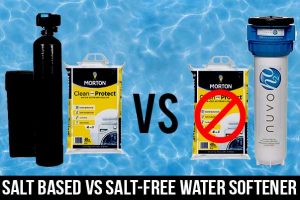
People have seen misleading information online (social media, blogs, etc.) or from friends about whether a salt-free or salt-based water softener is best for your home. That is why we are providing information on the difference between the two types of water softener systems and the pros and cons of buying each one.
Table of Contents
Salt-Based Water Softener
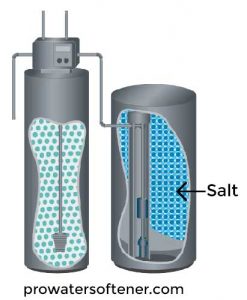
Some top-rated salt-based water softeners are Fleck 5600SXT, Whirlpool WHES40E, Water2Buy W2B800, Fleck Iron Pro 2, Culligan WH-HD200-C, etc. However, salt-based water softeners are perfect for the removal of hard water. Also, they are more efficient than salt-free water conditioners.
Pros of Salt-Based Softener
- Salt-based systems treat both staining metals and hard minerals, unlike conditioners that can treat only calcium and magnesium mainly.
- Salt-based water softeners actually remove all the nuancing metals and hard minerals from the water to make it soft. Dishes and laundry require less detergent and look better after being cleaned compared with other options.
- Softening uses an ion exchange process wherein sodium particles are exchanged for hard minerals and metals.
- This eliminates issues such as deposits on faucets and utensils, frizzy hair after hair wash, rough hands, and strong flavor of hard water.
- These can be used and pretreatment is not required for chlorine, hydrogen sulfide and metals. The process will not remove hydrogen sulfide and other treatment options may be required for elevated iron and manganese levels.
- The typical life of the resin is 10 years. However, if it is properly maintained, the resin can last twenty years or longer.
Related Post: Best Salt-Based Water Softener in 2024
Salt-Free Water Softener
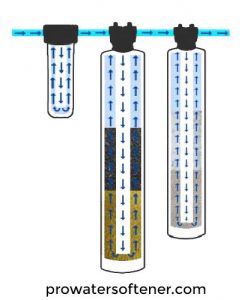
Moreover, saltless water softener works on a different principle, where it treats the hard water molecules to reduce the limescale from building up. Because they do not use salt, the treatment can either be through magnetic waves, electromagnetic waves, or filtration processes. Therefore, you get rid of the limescale deposits but not from hard water. Some best salt-free water conditioners are Aquasana Filter & Salt-Free Conditioner, Aquios FS-220, Eddy Electronic Water Descaler, Clearwave CW-125 Electronic Conditioner, and Nuvo H2O Dphb-a Home Water Softener System, etc.
Water is processed through catalytic media using a physical process called Template Assisted Crystallization (TAC). What happens is the hardness minerals are converted to a hardness crystal that cannot bind to surfaces. This is actually water conditioning, not softening. A water test would show this result: before treatment 10 grains/gallon, result post/treatment 10 grains/gallon. It just changed its property so it won’t adhere to surfaces.
There is no electrical valve needed on a salt-free system because the system works as a conditioner and never captures anything, therefore, eliminating the need to purge any minerals. Salt-Free Water Conditioners create hardness crystals but leave minerals present in the water. The crystals won’t adhere to surfaces so you will only see a reduction in scale build-up, not an elimination. Homeowners should not be expecting the same results as salt-based technology.
Since a salt-free system crystallizes the calcium in your water, the calcium won’t be able to adhere to the insides of your pipes. That reduces scale buildup in your plumbing, which is the only benefit that a salt-free system offers. This falls far short of the many benefits of a real water softener. Salt-based systems will outperform salt-free for overall water softening. The best way to soften water is with a salt-based softener.
Related Post: Best Salt-Free Water Softener
Salt-Based vs Salt-Free Water Softeners
Here is what we have concluded after reviewing consumer reports for both a salt-free water softener and a salt-based water softener.
| Features | Salt-Based Water Softener | Salt-Free Water Softener |
|---|---|---|
| Technology | Ion-Exchange | Magnetic, Electromagnetic, Chemical, Filter |
| Salt | Yes | No |
| Resin | Yes | No |
| Space | Need quite large space | Doesn’t need any extra space, fits easily on water supply pipe |
| Electricity | Yes | A few products require electricity |
| Installation | A bit complicated and require services by plumber | Super easy, anyone can install it |
| Maintenance | Requires continuous maintenance i.e. salt addition and resin replacement | Doesn’t require any maintenance |
| Price | A bit expensive | Comparatively inexpensive |
| Life Expectancy | 10 – 15 years | Most of these work for a lifetime |
Since the very definition of water softening requires that hard water minerals be removed, and the salt-free process only changes the minerals, allowing them to remain in the water, salt-free water softeners are not actually softening water rather, they are for water conditioning. However, salt-based water softeners only remove the hardness of water and minerals.
If you are looking for a water softener for your home, you need to get a basic understanding. The truth is that salt-free water softeners aren’t water softeners, don’t provide many of the same benefits that salt-based systems do, and aren’t certified to meet industry standards. The choice is clear—only a salt-based water softener is proven to provide softer water, healthier skin, and no scale buildup or soap scum. A salt-based system is a better investment. If you are confused, you can always check our recommendation below for both.
Check Here: Best-Rated Upflow Water Softeners
Frequently Asked Questions (FAQs)
1. Which is better salt or salt-free water softener?
A salt-based softener would be your better choice. Salt-Free Water Conditioners create hardness crystals but leave minerals present in the water. The crystals won’t adhere to surfaces so you will see a reduction in the scale build-up. You may see less soap usage and possibly brighter laundry.
2. Do salt-free water softeners really work?
During the ion exchange process, a resin bed attracts hard water minerals and replaces them with sodium ions; it is this removal of magnesium and calcium that defines “water softening”. In reality, salt-free water softeners do not actually soften water at all as they condition it.
3. Are salt-based water softeners bad for your health?
For most healthy people, the amount of added sodium in the softened water poses no health problems. However, for people who have high blood pressure and must live on a low-sodium diet or a sodium-restricted diet, sodium in the softened water can be hazardous to people’s health.
Check Out: Best Water Softening Unit for Hard Water in the UK

Steve Smith is a United State Licensed Plumber with over 18 years of plumbing experience. Steve has conducted residential and commercial plumbing jobs throughout the state and currently works for one of California’s largest plumbing companies. When he’s not working, Steve enjoys spending time with his daughter and son.
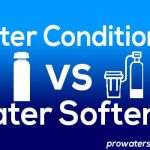
![Can you drink water from a water softener? [Important to Know] drinking soft water](https://prowatersoftener.com/wp-content/uploads/2021/03/drink-water-from-softener-150x150.jpg)
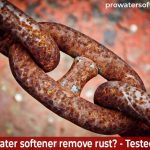
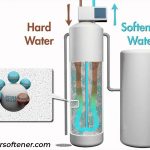



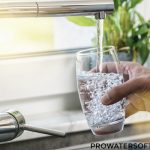
Leave a Reply